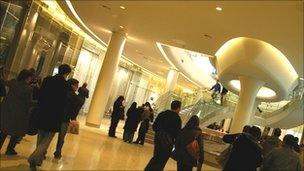UK economy seeing weak growth, PMI surveys indicate
- Published

Weak consumer spending is expected to hold back growth
The UK's economy is experiencing weak growth but inflation pressures have eased, research firm Markit has said.
The firm, which compiles the closely-watched purchasing managers' indexes (PMI), said the recent surveys indicated that UK growth in the second quarter was unlikely to exceed 0.3%.
However, easing inflation meant that an early rate rise was less likely.
Markit's latest PMI survey found that growth in the UK's service sector slowed in May.
It recorded a PMI reading of 53.8, down from 54.3 in April and the lowest reading since February. A figure above 50 indicates expansion.
The slowdown in the services sector - a key sector for the UK economy - was put down to weaker consumer spending, and the large number of public holidays in the month
Separate data released by the Office for National Statistics (ONS) showed that the volume of new construction orders in the first three months of the year fell by 23% from the previous quarter, and were down 18% from the same period last year.
Growth 'struggle'
Earlier this week, PMI surveys indicated that the manufacturing sector grew at its weakest pace in almost two years in May, while growth in the UK construction industry accelerated slightly.
Markit said the three surveys this week, external, "collectively signalled a slowing in the rate of economic growth for the second month running in May, taking the rate of expansion down to the weakest since heavy snowfall caused a near-stagnation of growth in December".
"The data suggest the economy could struggle to expand by more than 0.3% in the second quarter," he said.
Markit said the latest PMI data suggested "that there is an increased risk that growth in 2011 will fall below the 1.8% expansion forecast in the latest Bank of England forecast".
It said that growth was expected to remain weak in the second half of 2011, due to a number of factors including:
weak consumer confidence
weakening global economic growth
manufacturers reducing stocks
government spending cuts.
However, it noted that inflationary pressures had cooled recently, which may lead to a fall in the rate of consumer price inflation in the next few months.
Easing price pressures, the weak labour market and slow growth would "add to calls for the Bank [of England] to hold off on hiking interest rates until a clearer picture emerges of a robust and sustainable economic recovery", Markit said.
The Bank of England has kept interest rates at the historic low of 0.5% for more than two years, but in recent months its rate-setting body has been split over whether to start raising them.
Some on the Bank's Monetary Policy Committee (MPC) have argued rate rises are needed to cut the rate of inflation.
The CPI rate of inflation is currently 4.5%, and has now been more than one percentage point above the 2% target for 17 months in a row.
However, some fear that interest rate rises would stifle growth in the UK economy.
In the first three months of the year, the economy grew by 0.5%, but this followed a 0.5% contraction in the previous three months.
The first estimate for growth in the second quarter this year will be released by the ONS on 26 July.